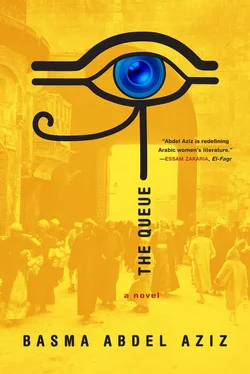Ehab ran into the woman with the short hair during an interview he was doing near Um Mabrouk. He greeted her warmly and, remembering their first meeting, told her lightheartedly that the lost bag was likely still lost — after everyone had agreed to his idea, the man in the galabeya had kept it in the end. He followed this with a hearty laugh, expecting her to join in, but displeasure flickered across her face. She was not at all amused; she took the matter seriously and felt that he’d failed her. She’d put her faith in him and he wasn’t acting like a real journalist should, with principles and skills. The crowd swelled around them, with people eating and drinking on one side and those waiting to be helped by Um Mabrouk on another, and the woman with the short hair gave up on the discussion. She shook her head in frustration and then glanced at her watch, as if in excuse, and returned to her place in the queue with the little radio she always carried.
Ehab spent two nights outside the queue and returned early the third morning with a copy of the newspaper he wrote for, which had published an important investigative piece he had written on additions to and deletions from the amended laws and decrees. He’d conducted interviews with people who were concerned with the issue, and explained in his article that despite how carefully the amended clauses must have been considered, there were a few things people objected to. He cited clause 4 (A) as an example, writing that the amendment had sparked considerable controversy, particularly from groups defending people’s rights. They pointed out how complex the law was — or “intricate,” as they put it — and respectfully suggested that it might be difficult for people to comply.
For example, some of those who had bullets lodged in their bodies were critically injured and incapable of submitting an application, waiting for their cases to be evaluated and substantiated, and then completing the paperwork for surgery permits.
Other groups condemned both the original text and the amendment to clause 4 (A). Their critique seemed objective and fair: Zephyr Hospital — the sole hospital exempt from the permit requirement — had only so many beds. If the Disgraceful Events flared up again, or other unrest broke out, it might not be able to accommodate all the injured. Some people might be forced to seek treatment in unregistered and unsafe hospitals, which would unleash a new wave of problems.
At the end of his article, Ehab cited an anonymous proposal that had been sent to the newspaper. It asked the Gate to open up other authorized branches in additional selected hospitals. With more hospitals operating under the Gate, surgery would become easier and more affordable. This move would also put a stop to all the wild rumors that the government was somehow to blame for the injuries, when all it sought to do was help the injured and, of course, protect the rights of its citizens.
Little by little, Um Mabrouk discovered that aside from her snacks, drinks, and cell phone, which at times drew several sub-queues of customers at once, the woman with the short hair attracted even more people just by being there. She watched her carefully, and soon realized that the throngs of people flocking to her stall and seating area had nothing to do with the woman herself but with her radio. Um Mabrouk reasoned that it created an inviting and lively atmosphere, which encouraged people to stay longer and order more drinks and sometimes roasted sweet potatoes and packets of cookies. Based on these observations, she began to invite the woman over to her stall every time she walked by. She was as friendly as could be and used every trick in the book to keep her there, until finally she made a generous offer that the woman agreed to. Um Mabrouk said she would give her free tea for as long as she stayed there, as long as the radio station played what people wanted to hear, not what she herself preferred.
As expected, Violet Telecom’s promotion was a huge success in the queue, and there seemed no limit to the number of free phones and contracts the company was willing to give away. But it suddenly came under close scrutiny when people made an unnerving discovery.
Their phones had begun to record their conversations and were transmitting them to a receiving device in the Booth. Somehow both phone calls and discussions happening around the phone were all being recorded — even when they weren’t actually making a call, and even when their phones were turned off. Ehab confirmed it: he’d been leaked top-secret information that the official in the Booth attached to the Gate was meant to review conversations and determine which of them indicated a degree of threat. He sent his evaluations directly to the basement of the Northern Building, where the conversations underwent a careful process of inspection and classification. These were added to the individual phone owner’s file, and in some cases, immediate actions were taken. Ehab also explained to people in the queue that when everyone’s phones had stopped working a couple of weeks ago, it had been a trial period. The company had been experimenting with the data-collection feature, and caused the outage in order to activate it on all of its customers’ phones, but the feature had worked only briefly. Instead, with the assistance of specialists, the company had hand-selected the most important conversations. It culled the most enigmatic and suspicious ones, those related to the Gate’s security, and put those people under constant surveillance. Then, to bring them into the network, it offered some of them free phone lines.
Ines had solid evidence to back up everything that Ehab had reported. Over afternoon tea, she confided in the woman with the short hair that she’d been shaken to discover she was under surveillance herself. She told the woman about her conversation with Shalaby, in which every syllable and every word had been recorded. Um Mabrouk confirmed the incident. Ehab produced the papers he’d kept, which included the whole conversation and many others. They had been stamped by the Booth and officially approved by the official, and he offered to show them to anyone who wanted to see them. With this discovery, and similar evidence that began to follow it, people stopped using phones, both their own and Um Mabrouk’s, except on rare occasions, and a wide-reaching boycott campaign gathered momentum. When Um Mabrouk announced that she was joining the campaign, her son removed the battery from her phone and took it back home. She rather liked the boycott, and was a staunch supporter. She was excited to join Ehab and his friends, and told her customers the part of the story that she herself was involved in, embellishing it with just a few tantalizing details.
People gradually discovered that the surveillance feature had spread beyond the queue and into other districts. No one knew whether it affected everyone, or just the free phone lines, or only those people whose conversations had been sent to the basement. Despite the public outcry, Violet Telecom continued to give out free phones, and a few days later published an advertisement in The Truth promising its customers a superior new service, with details to be announced in an upcoming offer. The company also warned citizens against believing false information spread by its less fortunate competitors, information that only aimed to tarnish its reputation and to deprive vast segments of the population — particularly the poor — from its free services. Meanwhile, rumors spread that some people whose conversations had been recorded had disappeared; they’d been summoned to the basement and never returned. These rumors left a visceral tension in their wake; people in the queue exchanged names of the disappeared and the dates they’d vanished, distributing flyers with their pictures and pleas to return them unharmed. Even though no one from the queue was missing, Ines was so overwhelmed by the situation that her support for the boycott began to wane, even though she’d been one of its first champions. She grew increasingly timid and withdrawn, and stopped drinking tea with Um Mabrouk.
Читать дальше











